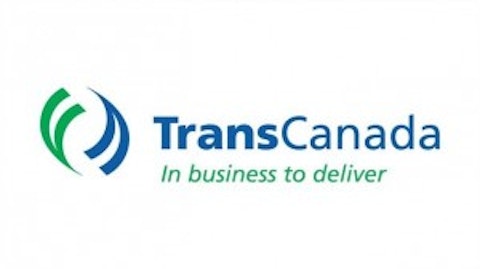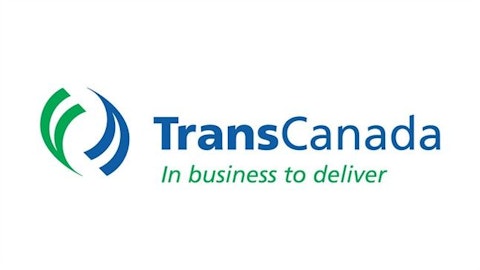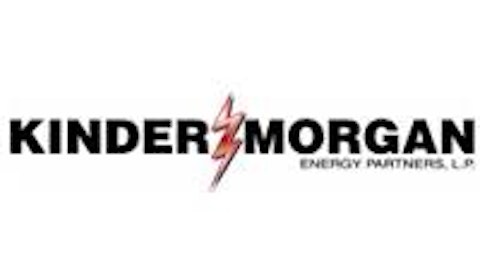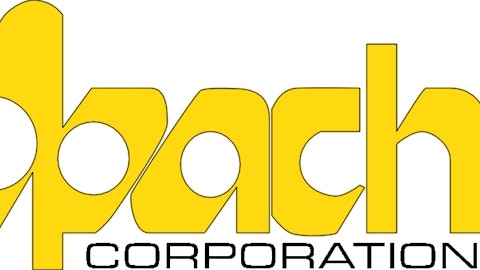The early July explosion of train cars carrying crude oil in Canada quickly turned into a disaster. It also exposed the risks of the increasing use of trains to transport oil. Although pipelines have their own risks, the fallout from this event will help support growth at pipeline giants like Enterprise Products Partners L.P. (NYSE:EPD), Kinder Morgan Energy Partners LP (NYSE:KMP), and TransCanada Corporation (USA) (NYSE:TRP).
Messy Business

For example, TransCanada Corporation (USA) (NYSE:TRP) has been trying to complete its KeystoneXL pipeline for years. The U.S. government has basically been withholding approval. The pipeline would bring oil from Canada’s oil sands region down to the U.S. Gulf Coast where it would be used as feedstock for refineries and reduce the country’s dependance on Middle East oil.
Environmental concerns are behind the red tape stopping progress. However, the current administration looks increasingly likely to push it through. The rail mishap should help justify that to the green lobby trying to stop the pipeline’s progress.
Bigger than Keystone
TransCanada Corporation (USA) (NYSE:TRP) is actually a pretty compelling investment option with or without Keystone. It’s a large pipeline player in Canada that has been diversifying its pipeline business beyond a focus on natural gas. It also has an electric utility business that notably diversifies its portfolio.
The nature of its pipelines business makes the top- and bottom-lines somewhat variable, but dividends have headed generally higher for a decade. The lone drop occurred during the 2007 to 2009 recession and was quickly reversed the next year.
The company’s shares have come down over the last few months as investors have shifted out of income stocks, increasing its appeal. And, if Keystone gets approved, the company’s growth potential only looks better. TransCanada Corporation (USA) (NYSE:TRP) is a solid broad-based energy play.
That said, the company isn’t a limited partnership (LP), so it can be purchased in a retirement account without running afoul of tax rules. The around 3.9% yield is among the lowest in the pipeline sector, but is still worthwhile.
A U.S. Giant
Enterprise Products Partners L.P. (NYSE:EPD) is among the largest LPs in the pipeline space. Its operations span The United States and touch on just about every aspect of the midstream business. At $42.5 billion, the company’s top line dwarfs TransCanada Corporation (USA) (NYSE:TRP)’s business.
Enterprise Products Partners L.P. (NYSE:EPD) has grown rapidly through acquisition and internal expansion projects, rewarding unitholders with years of regular dividend increases. The distribution has increased from around $1.40 a unit to over $2.50 over the past decade with increases often taken place every quarter.
The partnership’s size gives it notable advantages in the industry, since it can easily afford to both acquire and build massive pipelines. Of course size can be constraining, too, since the company needs massive projects if it wants to keep growth going. So investors will find a large and stable business, but one that probably won’t grow as quickly as the industry’s smaller players.
The shares have come back since the recent interest rate driven sell off and now yield around 4.3%. That’s in-line with TransCanada Corporation (USA) (NYSE:TRP). While the Canadian pipeline giant would be a good fit for a tax advantaged account, Enterprise Products Partners L.P. (NYSE:EPD)’s tax advantaged distributions would fit well in a taxable account.
Cheaper, but More Complicated
Enterprise Products Partners L.P. (NYSE:EPD)’s shares tend to trade hands at a premium price point because its size and scale adds notable value. A higher yielding LP option with a similar size advantage is Kinder Morgan Energy Partners LP (NYSE:KMP).
Kinder Morgan Energy Partners LP (NYSE:KMP)’s business when taken as a whole is equally as impressive as the one Enterprise Products Partners L.P. (NYSE:EPD) has built. However, Kinder Morgan Energy Partners LP (NYSE:KMP) has a more complex corporate structure, including a General Partner (GP), two LPs, and a share class that pays its distribution in units instead of cash so it can be owned in a retirement account. That added complexity has historically left Kinder Morgan Energy Partners LP (NYSE:KMP) trading at a discount to Enterprise, which doesn’t have a GP or any other entities to complicate the mix.
Yielding around 6.1%, Kinder Morgan Energy Partners LP (NYSE:KMP) has increased its distribution from $2.58 to $4.85 a unit over the past decade. Like Enterprise, the top and bottom lines are complicated by the LP structure. So distribution growth is the real show of strength that investors need to watch.
For investors seeking more yield than either TransCanada or Enterprise have to offer, Kinder Morgan is a solid option. For retirement accounts, investors should consider Kinder’s stock dividend share class Kinder Morgan Management (NYSE:KMR).
Moving Energy
Since building pipelines takes time, the rails will continue to be important to moving oil over the near-term. However, as long as oil is moved by rail, there’s opportunity for pipeline companies to grow. TransCanada has among the most public projects on the drawing board to boost growth. Enterprise and Kinder Morgan, meanwhile, have the size and scale to capitalize on increasing demand and to keep paying unitholders to stick around.
The article Pipelines Still Have Growth Ahead originally appeared on Fool.com.
Reuben Brewer has no position in any stocks mentioned. The Motley Fool recommends Enterprise Products Partners L.P. Reuben is a member of The Motley Fool Blog Network — entries represent the personal opinion of the blogger and are not formally edited.
Copyright © 1995 – 2013 The Motley Fool, LLC. All rights reserved. The Motley Fool has a disclosure policy.




